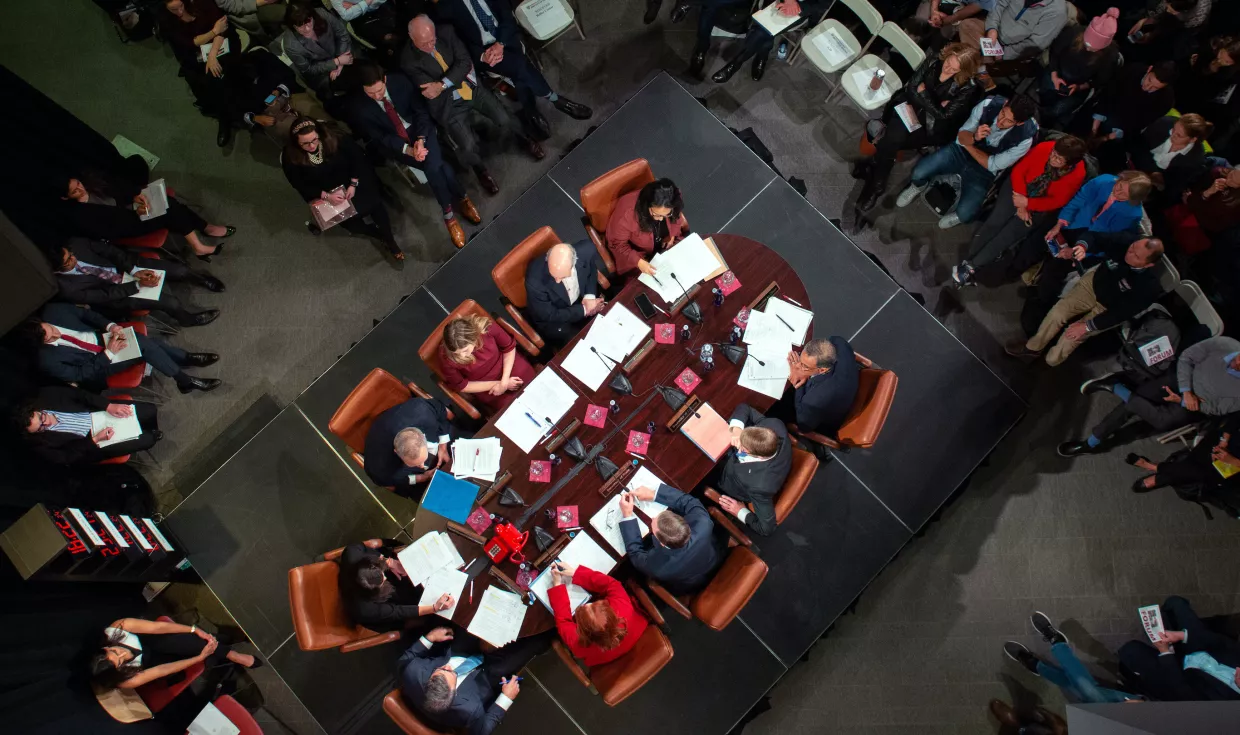The scenario was based on real and rapid developments in digital currency technology.
Digital currencies are on the rise. More than a decade after bitcoin made cryptocurrency mainstream, countries and central banks are evaluating whether to issue their own digital cash. The Belfer Center’s Economic Diplomacy Initiative (EDI) is exploring how policymakers should manage economic policy and the national security implications of this disruptive trend.

To illustrate the challenges posed by digital currency, EDI conducted a national security crisis simulation in Harvard Kennedy School’s JFK Jr. Forum. The simulation featured Harvard and MIT faculty and former government officials portraying National Security Council (NSC) members.
Meeting in the “White House Situation Room,” the participants debated how to respond to a North Korea missile test that demonstrated significant advancements in the country’s nuclear program. Those nuclear capabilities were funded using a Chinese digital currency, which U.S. authorities could not track.
The participants included:
- Eric Rosenbach (Co-Director, Belfer Center; former Cyber Czar, Pentagon) as National Security Adviser
- Aditi Kumar (Executive Director, Belfer Center; former Principal at Oliver Wyman and Project Manager, World Economic Forum) as Deputy National Security Adviser
- Ash Carter (Belfer Center Director; former Secretary of Defense) as Secretary of Defense
- Nicholas Burns (Founder of the Center’s Future of Diplomacy Project; former Ambassador and Under Secretary of State for Political Affairs) Secretary of State
- Lawrence Summers (Charles W. Eliot University Professor and President Emeritus of Harvard; former Secretary of the Treasury) as Secretary of Treasury
- Meghan O’Sullivan (Director of the Geopolitics of Energy Project; former Special Assistant to the President and Deputy National Security Adviser for Iraq and Afghanistan) as Vice President
- Jennifer Fowler (Director, Brunswick Group, D.C. and former Deputy Assistant Secretary for Terrorist Financing and Financial Crimes in the Department of Treasury) as Director of National Intelligence
- Richard Verma (Vice Chairman and Partner, Asia Group; former Ambassador and Assistant Secretary of State for Legislative Affairs) as Ambassador to China
- Gary Gensler (Professor of Practice of Global Economics and Management, MIT School of Management; former Chairman of the U.S. Commodity Futures Trading Commission) as Assistant to the President for Economic Policy
- Neha Narula (Director of the Digital Currency Initiative, MIT Media Lab; former senior software engineer, Google) as Assistant to the President for Digital Currencies
While the scenario was fictionalized, it was based on the real and rapid developments in digital currency technology, led by China’s efforts to launch a digital yuan and Facebook’s proposed Libra coin.
The simulation facilitated a policy discussion on the potential role of digital currencies in the global economy and its implications for U.S. national security. It showed how initiatives to develop alternative monetary systems affect the ability of the U.S. to implement sanctions, monitor illicit activities, and uphold data privacy standards. The simulation also illustrated the inner dynamics and decision-making processes of officials in the Situation Room.
Learn more about the Economic Diplomacy Initiative here.
"Digital Currency Wars Simulation Tests New Economic Challenges." Belfer Center Newsletter, Belfer Center for Science and International Affairs, Harvard Kennedy School. (Spring 2020)



